The Intel Core i9-9980XE CPU Review: Refresh Until it Hertz
by Ian Cutress on November 13, 2018 9:00 AM ESTHEDT Performance: Office Tests
The Office test suite is designed to focus around more industry standard tests that focus on office workflows, system meetings, some synthetics, but we also bundle compiler performance in with this section. For users that have to evaluate hardware in general, these are usually the benchmarks that most consider.
All of our benchmark results can also be found in our benchmark engine, Bench.
PCMark 10: Industry Standard System Profiler
Futuremark, now known as UL, has developed benchmarks that have become industry standards for around two decades. The latest complete system test suite is PCMark 10, upgrading over PCMark 8 with updated tests and more OpenCL invested into use cases such as video streaming.
PCMark splits its scores into about 14 different areas, including application startup, web, spreadsheets, photo editing, rendering, video conferencing, and physics. We post all of these numbers in our benchmark database, Bench, however the key metric for the review is the overall score.
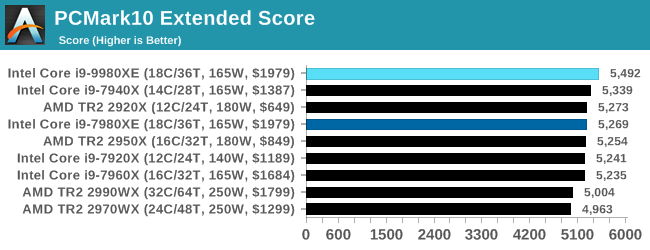
A small bump in the result here because of the added core frequency.
Chromium Compile: Windows VC++ Compile of Chrome 56
A large number of AnandTech readers are software engineers, looking at how the hardware they use performs. While compiling a Linux kernel is ‘standard’ for the reviewers who often compile, our test is a little more varied – we are using the windows instructions to compile Chrome, specifically a Chrome 56 build from March 2017, as that was when we built the test. Google quite handily gives instructions on how to compile with Windows, along with a 400k file download for the repo.
In our test, using Google’s instructions, we use the MSVC compiler and ninja developer tools to manage the compile. As you may expect, the benchmark is variably threaded, with a mix of DRAM requirements that benefit from faster caches. Data procured in our test is the time taken for the compile, which we convert into compiles per day.
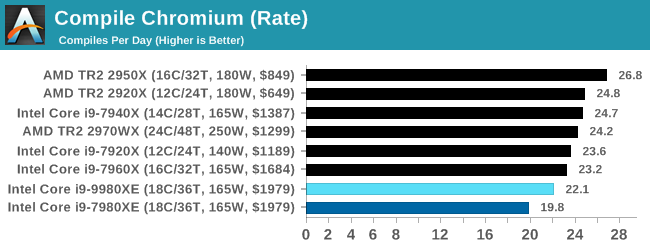
For the compile test, the 9980XE brings the 18-core up to being more competitive, however this test does seem to prefer fewer cores, lower crosstalk, and higher frequencies. AMD's 16-core TR2 wins here, adding 20% perf over the 9980XE for under half the cost.
3DMark Physics: In-Game Physics Compute
Alongside PCMark is 3DMark, Futuremark’s (UL’s) gaming test suite. Each gaming tests consists of one or two GPU heavy scenes, along with a physics test that is indicative of when the test was written and the platform it is aimed at. The main overriding tests, in order of complexity, are Ice Storm, Cloud Gate, Sky Diver, Fire Strike, and Time Spy.
Some of the subtests offer variants, such as Ice Storm Unlimited, which is aimed at mobile platforms with an off-screen rendering, or Fire Strike Ultra which is aimed at high-end 4K systems with lots of the added features turned on. Time Spy also currently has an AVX-512 mode (which we may be using in the future).
For our tests, we report in Bench the results from every physics test, but for the sake of the review we keep it to the most demanding of each scene: Cloud Gate, Sky Diver, Fire Strike Ultra, and Time Spy.
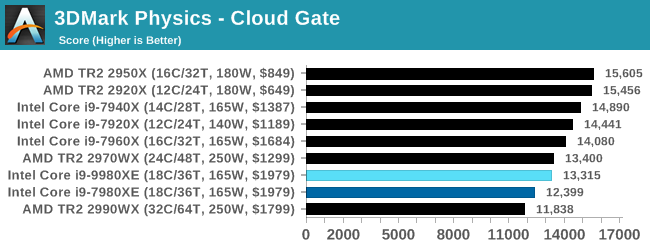
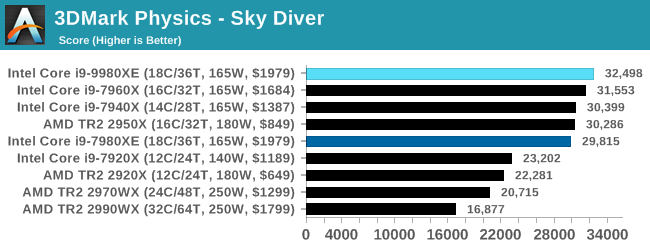
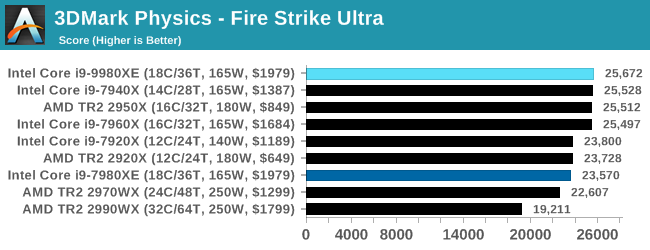
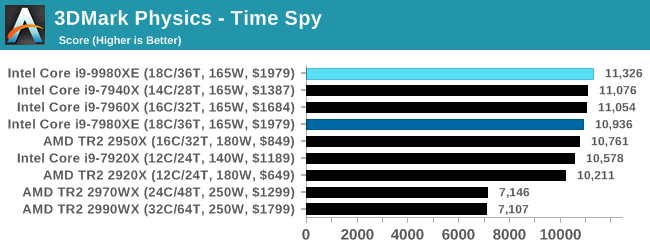
The newer engines can take advantage of the higher core count parts, and Intel's unified memory design also helps here.
GeekBench4: Synthetics
A common tool for cross-platform testing between mobile, PC, and Mac, GeekBench 4 is an ultimate exercise in synthetic testing across a range of algorithms looking for peak throughput. Tests include encryption, compression, fast Fourier transform, memory operations, n-body physics, matrix operations, histogram manipulation, and HTML parsing.
I’m including this test due to popular demand, although the results do come across as overly synthetic, and a lot of users often put a lot of weight behind the test due to the fact that it is compiled across different platforms (although with different compilers).
We record the main subtest scores (Crypto, Integer, Floating Point, Memory) in our benchmark database, but for the review we post the overall single and multi-threaded results.
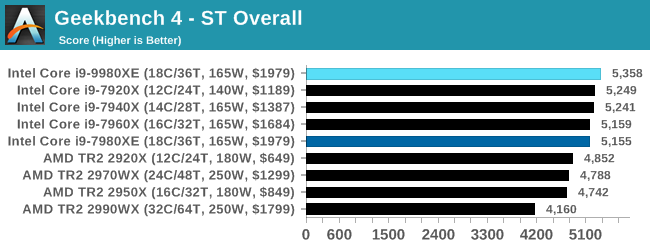
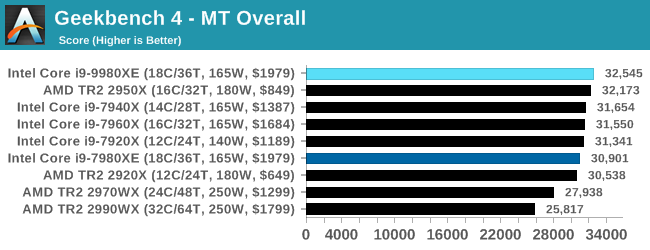










143 Comments
View All Comments
TEAMSWITCHER - Tuesday, November 13, 2018 - link
I never said that we didn't have external monitors, keyboards, and mice for desktop work. However, from 25 years of personal experience in this industry I can tell you emphatically .. productivity isn't related to the number of pixels on your display.HStewart - Tuesday, November 13, 2018 - link
Exactly - I work with 15 in IBM Thinkpad 530 that screen is never used - but I have 2 24in 1980p monitors on my desk at home - if I need to go home office - hook it up another monitor - always with external monitor.It is really not the number of pixels but size of work sapace. I have 4k Dell XPS 15 2in1 and I barely use the 4k on laptop - I mostly use it hook to LG 38U88 Ultrawide. I have option to go to 4k on laptop screen but in reality - I don't need it.
Atari2600 - Tuesday, November 13, 2018 - link
I'd agree if you are talking about going from 15" 1080p laptop screen to 15" 4k laptop screen.But, if you don't see significant changes in going from a single laptop screen to a 40" 4k or even just dual SD monitors - any arrangement that lets you put up multiple information streams at once, whatever you are doing isn't very complicated.
twtech - Thursday, November 15, 2018 - link
Maybe not necessarily the number of pixels. I don't think you'd be a whole lot more productive with a 4k screen than a 2k screen. But screen area on the other hand does matter.From simple things like being able to have the .cpp, the .h, and some other relevant code file all open at the same time without needing to switch windows, to doing 3-way merges, even just being able to see the progress of your compile while you check your email. Why wouldn't you want to have more screen space?
If you're going to sit at a desk anyway, and you're going to be paid pretty well - which most developers are - why sacrifice even 20, 10, even 5% productivity if you don't have to? And personally I think it's at the higher end of that scale - at least 20%. Every time I don't have to lose my train of thought because I'm fiddling with Visual Studio tabs - that matters.
Kilnk - Tuesday, November 13, 2018 - link
You're assuming that everyone who needs to use a computer for work needs power and dual monitors. That just isn't the case. The only person kidding themselves here is you.PeachNCream - Tuesday, November 13, 2018 - link
Resolution and the presence or absence of a second screen are things that are not directly linked to increased productivity in all situations. There are a few workflows that might benefit, but a second screen or a specific resolution, 4k for instance versus 1080, doesn't automatically make a workplace "serious" or...well whatever the opposite of serious is in the context in which you're using it.steven4570 - Tuesday, November 13, 2018 - link
"I wouldn't call them very "professional" when they are sacrificing 50+% productivity for mobility."This is quite honestly, a very stupid statement without any real practical views in the real world.
Atari2600 - Wednesday, November 14, 2018 - link
Not really.The idiocy is thinking that working off a laptop screen is you being as productive as you can be.
The threshold for seeing tangible benefiting from more visible workspace (when so restricted) is very low.
I can accept if folks say they dock their laptops and work on large/multiple monitors - but absolutely do not accept the premise that working off the laptop screen should be considered effective working. If you believe otherwise, you've either never worked with multiple/large screens or simply aren't working fast enough or on something complicated enough to have a worthwhile opinion in the matter! [IMO it really is that stark and it boils my piss seeing folks grappling with 2x crap 20" screens in engineering workplaces and their managers squeezing to make them more productive and not seeing the problem right in front of them.]
jospoortvliet - Thursday, November 15, 2018 - link
Dude it depends entirely on what you are doing. A writer (from books to marketing) needs nothing beyond a 11" screen... I'm in marketing in a startup and for half my tasks my laptop is fine, writing in particular. And yes as soon as I need to work on a web page or graphics design, I need my two screens and 6 virtual desktops at home.I have my XPS 13 for travel and yes I take a productivity hit from the portability, but only when forced to use it for a week. Working from a cafe once or twice a week I simply plan tasks where a laptop screen isn't limiting and people who do such tasks all day (plenty) don't NEED a bigger screen at all.
He'll I know people who do 80% of their work on a freaking PHONE. Sales folks probably NEVER need anything beyond a 15" screen, and that only for 20% of their work...
Atari2600 - Thursday, November 15, 2018 - link
I never said the non-complicated things need anything more than 1 small screen!